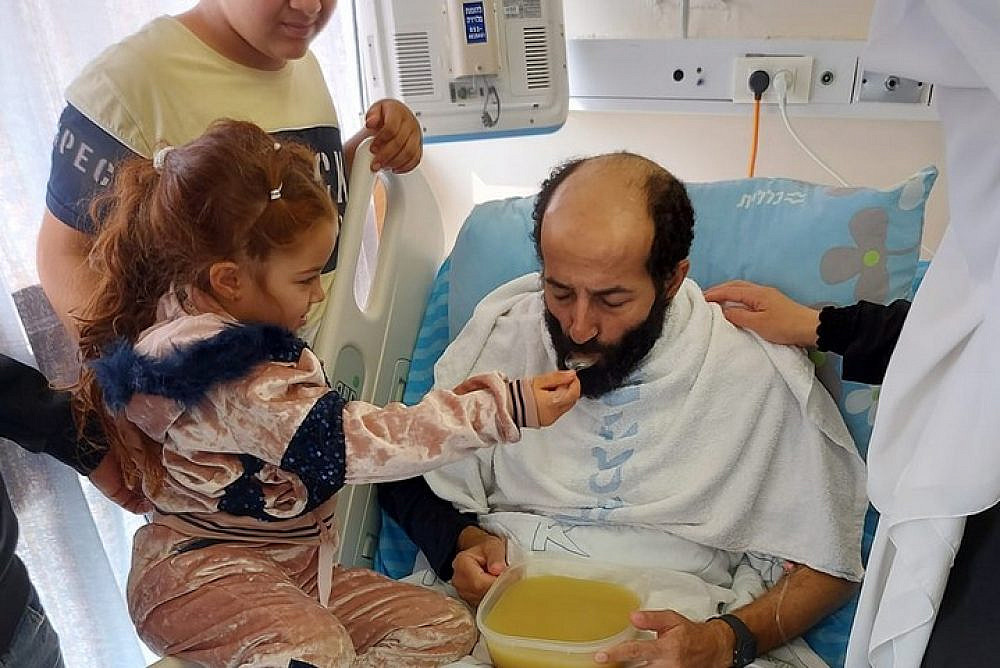Palestinian and Israeli activists, along with Joint List Knesset Members, excitedly celebrated the forthcoming release of Maher al-Akhras, a Palestinian who had spent 103 days on hunger strike in protest at his administrative detention.
The announcement came on Friday night after al-Akhras reached an agreement with the Shin Bet, Israel’s internal security agency, according to which he will be released on Nov. 26. His detention will not be renewed.
The joy is understandable: it is difficult not to get excited at the sight of al-Akhras’ daughter feeding her gaunt father his first sips of soup in his hospital bed. In a reality in which Palestinian life is cheap, the fact that al-Akhras’ life was saved as he reached the precipice is something to be welcomed.
But this was no victory. Not only are the conditions for al-Akhras’ release the same ones offered to him a month ago, but his heroic hunger strike failed to change the Shin Bet’s rules regarding administrative detention and acts of protest against those rules.
It is, at the bottom of it all, a game of “who blinks first.” From the moment an administrative detainee launches a hunger strike, a brutal duel begins between their individual willpower and the Shin Bet’s determination to deprive the detainee of their liberty. It’s an Israeli version of the Hunger Games: belligerence, arbitrariness, and the ruler’s total disinterest in the Palestinians’ lives.
Even when their protests achieved some results, the attempts by Maher al-Akhras and other hunger-striking detainees before him to change these rules of the game have failed miserably — both to reduce the sheer amount of people in administrative detentions, and to achieve the full freedom of the hunger strikers themselves.
According to human rights group B’Tselem — which relies on data provided by the Israel Prison Service and the Israeli army — aside from a small dip between 2012 and 2013, hundreds of Palestinians, including minors, are being held in Israel as administrative detainees at any given moment. As of September 2020, for example, there were about 350 Palestinians in administrative detention, including two minors.
Hunger strikes fail to change these sweeping prisoner policies in large part because the Israeli Supreme Court never challenges the legitimacy of administrative detentions. When a hunger striker is in danger of dying, the court may — as in the case of al-Akhras — “suspend” their detention, but judges never dare question the Shin Bet’s use of it, much less demand an explanation of how the state repeatedly detains someone without formulating the evidentiary basis to bring them to trial.
Instead, the Supreme Court continues to indulge the Shin Bet’s diktats, extends to them one-sided hearings behind closed doors, and relies on the agency’s secret materials — even when such evidence is found to be false. Ultimately, appeals lodged by hunger strikers only strengthen the court’s sweeping rubber-stamping of these practices.
Moreover, the hunger strikes are exacting an immense political toll. Over time, and with each case, the Shin Bet is showing ever-greater rigidity regarding administrative detention — with limitless support from the judiciary. As Oren Ziv wrote last week, the justice system is sending a clear message that it does not care whether a prisoner lives or dies.
On this occasion at least, this disregard is likely connected to the fact that al-Akhras’ hunger strike has not provoked demonstrations in the occupied territories — whether due to his political affiliations or the ongoing COVID-19 restrictions. But whatever the reason, the Shin Bet permitted itself to wait until after al-Akhras’ strike had reached its 100th day, and gave no impression that they would have “folded” had he continued to refuse their “offer.” Even in its attempt to make an example of al-Akhras, the Shin Bet has notched a win.
We must unreservedly welcome the fact that al-Akhras’ life was saved at the very last minute. But we cannot wait for the next hunger striker in order to oppose the practice of administration detention, one of the most despicable tools used against Palestinians under occupation. At this rate, the next hunger striker may lose their life as a result of their protest. Given the public and systemic indifference to Palestinian life, no one will blink an eye.
This article was first published in Hebrew on Local Call. Read it here.


